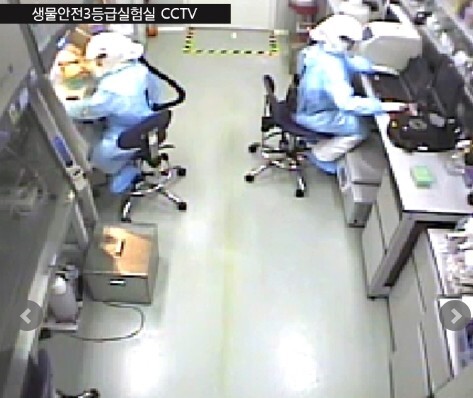hankyoreh
Links to other country sites 다른 나라 사이트 링크
S. Korea makes strides in drug repositioning as researchers work on COVID-19 treatments

The South Korean government and research institutes are making tangible progress in drug repositioning as they hasten to develop a treatment for COVID-19, the disease resulting from the novel coronavirus. Drug repositioning, also called repurposing, refers to applying medications that are already approved, on sale, or in development to the treatment of other diseases.
Research into drug repositioning for COVID-19 is being carried out by the Korea Research Institute of Chemical Technology (KRICT), Institut Pasteur Korea, the Korea Research Institute of Bioscience and Biotechnology, the Korea Mouse Phenotyping Center at Seoul National University, and Korea University, with each institution in charge of a different aspect of research.
Institut Pasteur Korea, which is responsible for medication screening, a key component of drug repositioning, reported on its research during a seminar with the Ministry of Science and ICT that was held at KRICT on Mar. 26. After assessing 3,000 medications, including 1,500 approved by the US Food and Drug Administration, the institute said, it had identified 20 that might be effective, including ciclesonide, used for asthma medication, and niclosamide, used for tapeworm infections. These research findings were posted on bioRxiv (pronounced “bio-archive”), a preprint server carrying articles for biological research, on Mar. 21.
“The asthma medication circlesonide (marketed as Alvesco) was also found to have an outstanding medical effect in cross-validation by KRICT. Ciclesonide is a promising candidate for treating COVID-19 because it can be directly inhaled by the lungs in the form of an inhalant,” Institut Pasteur Korea said.
Cepharanthine, a supplementary medication used for counteracting hair loss, was one of the top seven medications recommended by IBM’s Summit, the fastest supercomputer in the world, in a review of 8,000 therapeutic candidates. That medication is currently being tested for its therapeutic effectiveness at a public health center at the University of Tennessee.
KRICT is another organization in charge of screening medications. It recently finished screening medications recommended by South Korean doctors and is now carrying out a large-scale project designed to screen 1,500 medications.
Simultaneously, KRICT is carrying out a study of eight medications (including remdesivir, chloroquine, and lopinavir) that are temporarily being used by doctors both in South Korea and other countries. Among the eight medications, the most effective was remdesivir, an Ebola medication developed by Gilead Sciences, an American biotechnology company, while chloroquine and hydroxychloroquine, both medications used to treat malaria, were also found to be effective.
In order to verify these medications’ efficacy, the two institutes are planning to have the Korea Research Institute of Bioscience and Biotechnology carry out animal testing on primates.
“The supplementary budget that was passed last week allocates 2.15 billion won (US$1.78 million) for drug repositioning. We’ll ensure that this money is used to acquire more equipment for drug screening, so as to accelerate research into drug repositioning,” said Science and ICT Minister Choi Ki-young.
By Kwak No-pil, senior staff writer
Please direct comments or questions to [english@hani.co.kr]

Editorial・opinion
![[Editorial] Penalties for airing allegations against Korea’s first lady endanger free press [Editorial] Penalties for airing allegations against Korea’s first lady endanger free press](https://flexible.img.hani.co.kr/flexible/normal/500/300/imgdb/original/2024/0502/1817146398095106.jpg) [Editorial] Penalties for airing allegations against Korea’s first lady endanger free press
[Editorial] Penalties for airing allegations against Korea’s first lady endanger free press![[Editorial] Yoon must halt procurement of SM-3 interceptor missiles [Editorial] Yoon must halt procurement of SM-3 interceptor missiles](https://flexible.img.hani.co.kr/flexible/normal/500/300/imgdb/child/2024/0501/17145495551605_1717145495195344.jpg) [Editorial] Yoon must halt procurement of SM-3 interceptor missiles
[Editorial] Yoon must halt procurement of SM-3 interceptor missiles- [Guest essay] Maybe Korea’s rapid population decline is an opportunity, not a crisis
- [Column] Can Yoon steer diplomacy with Russia, China back on track?
- [Column] Season 2 of special prosecutor probe may be coming to Korea soon
- [Column] Park Geun-hye déjà vu in Yoon Suk-yeol
- [Editorial] New weight of N. Korea’s nuclear threats makes dialogue all the more urgent
- [Guest essay] The real reason Korea’s new right wants to dub Rhee a founding father
- [Column] ‘Choson’: Is it time we start referring to N. Korea in its own terms?
- [Editorial] Japan’s rewriting of history with Korea has gone too far
Most viewed articles
- 1Months and months of overdue wages are pushing migrant workers in Korea into debt
- 2[Editorial] Penalties for airing allegations against Korea’s first lady endanger free press
- 3Trump asks why US would defend Korea, hints at hiking Seoul’s defense cost burden
- 4Bills for Itaewon crush inquiry, special counsel probe into Marine’s death pass National Assembly
- 560% of young Koreans see no need to have kids after marriage
- 6Korean firms cut costs, work overtime amid global economic uncertainties
- 7[Guest essay] Maybe Korea’s rapid population decline is an opportunity, not a crisis
- 81 in 3 S. Korean security experts support nuclear armament, CSIS finds
- 9S. Korea discusses participation in defense development with AUKUS alliance
- 10[Reporter’s notebook] In Min’s world, she’s the artist — and NewJeans is her art